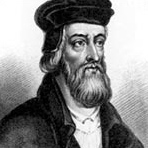John Wycliffe
John Wycliffe (lived from about 1320 to 1384 in England)[1] was an English theologian. He was one of the first to translate the Christian Bible into English, the common language. His version is generally known as "Wyclif's Bible".[2] A mission agency bearing his name, Wycliffe Bible Translators, still translates the scriptures into languages used around the world.


Wycliffe wrote that papal claims of temporal power had no foundation in the scriptures and that the Bible alone should be the standard of Christian belief and practice.
His family lived in a lower social class and did not live in great wealth but was not poor either. Later, after Wycliffe had grown up, he attended Oxford University, where he earned an arts degree. He became Master of Balliol College, Oxford, in 1361.[3] He was also given a parish in Lincolnshire, which meant he had to give up the position of Master of Balliol. He lived at Oxford for a large portion of his life and worked as a rector, a member of the clergy, at local churches.
Many other changes came to his life. Some of his ideas disagreed with the Church's, but he had the support and protection of John of Gaunt, who then ruled England.[4]
Wycliffe encouraged the Church to benefit the sinners of the world by living a life of poverty, but not everyone agreed with his thoughts and ideas. In some of his later writings, he wrote that the Bible was the authority of the Christian religion, and it was not of the Church. In 1382, his followers, known as the Lollards, helped him translate the Bible. Early Protestants called him the first great reformer.[5][6][7]
Related pages
changeReferences
change- ↑ Surname is also spelled Wyclif, Wycliff, Wiclef, Wycliffe, Wicliffe, or Wickliffe.
- ↑ Partridge A.C. 1973. English biblical translations. London: Andre Deutsch, The English Bible to Wyclif, 19–32. ISBN 0-233-96129-1
- ↑ The Master of Balliol is head of the College.
- ↑ Richard II was a minor.
- ↑ Stockdale, Nancy. John Wycliffe. World History: Ancient and Medieval Eras. ABC-CLIO, 2013. Web. 27 Feb. 2013.
- ↑ John Wycliffe. Historic World Leaders. Gale, 1994. Biography In Context. Web. 27 Feb. 2013.
- ↑ Williams, Peter W. Wycliffe, John. World Book Advanced. World Book, 2013. Web. 27 Feb. 2013.